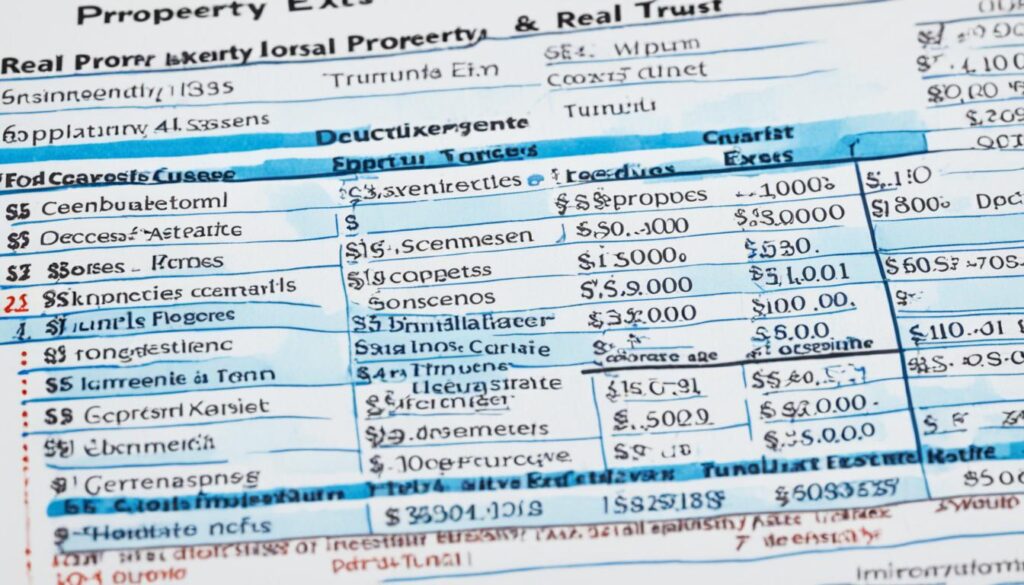When it comes to setting up a trust, the cost involved can be a significant consideration. Not only do you want to ensure that your assets are protected and your wishes are carried out, but you also want to understand the potential tax implications. So, here’s the burning question: is the cost of setting up a trust tax deductible or not? Let’s find out!
Key Takeaways:
- Trust or estate administrative expenses and excess deductions on termination may be tax deductible, based on IRS regulations.
- While miscellaneous itemized deductions are generally not allowed for trusts or estates, certain deductions specific to the trust or estate may be eligible for deduction.
- Expenses incurred solely because of the existence of a trust or estate, such as attorney fees, trustee fees, and tax preparation fees, may be deductible.
- Deductible expenses for real property held by a trust or estate include maintenance and upkeep costs, but not improvements.
- The cost of setting up a trust can vary based on factors such as the type of trust, complexity, and whether you hire an attorney or use a DIY approach.
Now that you have an idea of what to expect, let’s delve deeper into the deductions allowed for a trust or estate and explore the different types of trusts and their associated costs. Understanding the tax considerations and seeking financial advice can go a long way in ensuring that you make informed decisions when it comes to setting up a trust.
So, are you ready to uncover the truth about trust setup costs and tax deductibility? Let’s get started!
Deductions Allowed for a Trust or Estate
When it comes to managing the financial aspects of a trust or estate, understanding the deductions that are allowed is crucial. Deductions can help minimize tax liabilities and ensure that the administration of the trust or estate remains financially viable. In this section, we will explore the various deductions that are permitted for trusts and estates, as well as the regulations that govern them.
Deductible Expenses Specific to Trusts and Estates
Trusts and estates incur certain expenses that are directly related to their administration and are therefore considered deductible. These expenses include:
- Tax preparation fees for trust or estate tax returns
- Attorney fees incurred for legal services specific to the trust or estate
- Trustee fees for managing and overseeing the trust or estate
- Management and maintenance expenses for the upkeep of the trust or estate
- Investment advisory fees for professional investment advice tailored to the trust or estate
- Fees paid to a personal representative or fiduciary responsible for the trust or estate
- The personal exemption of an estate or trust, which can be claimed as a deduction
- Distribution deductions for trusts and estates, which include the amounts distributed to beneficiaries
These expenses are not considered miscellaneous itemized deductions and are fully deductible. It’s important to keep accurate records of these expenses to support your claims during tax filings.
Excess Deductions on Termination
In addition to the deductions specific to the administration of a trust or estate, excess deductions on termination can also impact the tax liabilities for beneficiaries. When a trust or estate terminates, any excess deductions that were not utilized during its existence are passed through to the beneficiaries. These excess deductions are then treated as deductions for the beneficiaries, following the same regulations as the trust or estate itself.
To illustrate the deductions allowed for a trust or estate, here is a summary table showcasing the different deductible expenses and the corresponding regulations:
| Deductible Expenses | Regulations |
|---|---|
| Tax preparation fees | Allowed as a deduction for trust or estate tax returns |
| Attorney fees | Deductible for legal services specific to the trust or estate |
| Trustee fees | Deductible for management and oversight of the trust or estate |
| Management and maintenance expenses | Permitted for the upkeep of the trust or estate |
| Investment advisory fees | Deductible for professional investment advice tailored to the trust or estate |
| Fees paid to a personal representative or fiduciary | Allowable for services provided to the trust or estate |
| Personal exemption | Deductible for estates or trusts |
| Distribution deductions | Include amounts distributed to beneficiaries |
It’s important to consult with a tax professional or financial advisor to ensure that you are fully aware of the deduction regulations applicable to your specific trust or estate. By taking advantage of the deductions allowed, you can effectively manage the financial aspects and optimize the tax benefits of your trust or estate.
Continue reading Section 3: Expenses Deductible for Real Property Held by a Trust or Estate.
Expenses Deductible for Real Property Held by a Trust or Estate

When it comes to real property held by a trust or estate, such as a house, there are deductible expenses that you need to consider. These expenses are related to the upkeep and maintenance of the property and can provide tax benefits for the trust or estate.
Expenses that are necessarily incurred in preserving and distributing the estate, including the cost of storing or maintaining the property, are deductible as long as they are permitted by the regulations. This means that expenses like property repairs, utilities, and insurance can be deducted, helping to offset the overall tax burden.
However, it’s important to note that expenses for improvements to the property are not deductible. Instead, these expenses should be added to the property’s basis, which is used to calculate capital gains when the property is sold.
The deductible expenses for real property held by a trust or estate are considered reasonable and necessary administrative expenses. As such, they are eligible for deductions according to the specific regulations and guidelines set forth by the IRS.
By taking advantage of these deductible expenses, you can help reduce the overall tax liability for the trust or estate while ensuring that the property is well-maintained. It’s important to keep accurate records of these expenses and consult with a tax professional or estate planner to ensure compliance with the deduction regulations.
Types of Trusts and their Costs
When it comes to setting up a trust, it’s important to understand the different types available and the associated costs. Trusts provide a way to manage and protect your assets, ensuring they are distributed according to your wishes. Let’s explore the various types of trusts and the expenses involved in their formation.
Living Trusts
A living trust, also known as an inter vivos trust, is a popular choice for many individuals. It allows you to transfer your assets into a trust while you’re still alive, giving you control over your assets during your lifetime and seamlessly transitioning them to your beneficiaries upon your passing. Living trusts can be set up as either revocable or irrevocable trusts.
Revocable Trusts
In a revocable trust, you have the flexibility to modify or revoke the trust’s provisions during your lifetime. This means you can make changes if your circumstances or wishes change. Revocable trusts offer more control but may have a higher cost due to their flexibility.
Irrevocable Trusts
On the other hand, an irrevocable trust cannot be altered or revoked after it is created. Once you transfer your assets into an irrevocable trust, they are no longer considered part of your estate. This type of trust provides additional protection and control over assets but may have higher initial costs and limited flexibility.
Now let’s talk about the costs associated with setting up a trust. The expenses can vary depending on several factors:
- Attorney Fees: Hiring an attorney to assist you with trust formation can provide valuable legal expertise and guidance. Attorney fees typically range from $1,500 to $2,500, but this can vary depending on the complexity of your trust and the attorney’s rates.
- DIY Options: If you prefer a more cost-effective approach, there are DIY options available. Online software and templates can assist you in creating a trust on your own, with costs ranging from a few hundred dollars to a thousand dollars.
It’s important to consider your specific needs, the complexity of your estate, and the state you reside in when determining the most suitable and cost-effective option for setting up your trust. Consulting with an attorney or trusted financial advisor can provide further guidance tailored to your unique situation.
| Type of Trust | Flexibility | Initial Costs |
|---|---|---|
| Revocable Trust | High | $$ |
| Irrevocable Trust | Low | $$ |
| DIY Trust | Variable | $ – $$ |
Assets Compatible with Living Trusts

When it comes to living trusts, you have the flexibility to include a variety of assets in your estate plan. By transferring assets to your trust, you can enjoy several benefits such as avoiding probate court, protecting assets from creditors, and ensuring a smooth distribution process. Let’s explore the types of assets that are compatible with living trusts:
- Bank accounts: You can transfer your checking, savings, and money market accounts into your living trust.
- Financial investments: Stocks, bonds, mutual funds, and other investment accounts can be held in your trust.
- Real estate: Your primary residence, vacation homes, rental properties, and land can all be included in your trust.
- Insurance policies: Life insurance policies can be owned by your living trust, ensuring the proceeds are distributed according to your wishes.
- Tangible property: Valuable possessions like artwork, jewelry, collectibles, and vehicles can be transferred to your trust.
It’s important to note that not all assets are suitable for transfer to a trust. Retirement accounts, such as IRAs and 401(k)s, and health savings accounts should not be included in your living trust. Transferring these assets may trigger undesirable tax consequences. Additionally, if you have international assets, it’s crucial to consult with an estate lawyer to determine their transferability to a U.S.-based trust.
Now, let’s take a moment to visualize how different assets can be compatible with living trusts:
| Asset | Compatible with Living Trust? |
|---|---|
| Bank accounts | Yes |
| Financial investments | Yes |
| Real estate | Yes |
| Insurance policies | Yes |
| Tangible property | Yes |
| Retirement accounts | No |
| Health savings accounts | No |
| International assets | Consult with an estate lawyer |
By carefully selecting the assets to include in your living trust, you can take advantage of the benefits it offers, ensuring your wishes are carried out efficiently and effectively.
Considerations for Trust Setup Costs
When it comes to setting up a trust, there are several factors to consider, including the associated costs. Choosing the right method for trust setup can greatly impact the expenses involved. Let’s explore some options and considerations to help you make an informed decision.
1. Hiring an Attorney
One option is to hire an attorney to handle the trust setup process. Attorneys have the expertise and knowledge to ensure that your trust and legal documents are prepared accurately and in compliance with the law. However, it’s important to note that attorney fees for trust setup can be substantial. On average, hiring an attorney may cost you around $1,500 to $2,500.
2. DIY Trust Creation
If you’re looking for a more affordable approach, you might consider creating a trust yourself using DIY methods. DIY trust creation options, such as online software, provide templates and step-by-step guidance to help you navigate the process independently. DIY options can cost a few hundred dollars, making them a budget-friendly alternative to hiring an attorney.
However, it’s essential to recognize the potential risks associated with DIY trust creation. Without the expertise of a professional, there is a higher chance of errors or oversights that could lead to legal complications down the road. It’s crucial to weigh the cost savings against the importance of a legally sound trust.
3. Combining Attorney Services with DIY
Another consideration is to combine the services of an attorney and DIY methods. You can opt to use online software to create the initial trust documents yourself and then have an attorney review them to ensure their accuracy and compliance with state laws. This hybrid approach may help you save on costs while still benefiting from professional guidance.
4. Factors Affecting Trust Setup Costs
The overall cost of setting up a trust may vary based on several factors, such as your personal situation, the complexity of the trust, and the state you reside in. Complex trusts, such as those involving multiple beneficiaries or intricate asset distributions, may require more attorney involvement, resulting in higher fees. Additionally, some states have higher attorney fee structures than others, impacting the overall cost.
Tax Considerations for Trusts and Estates

When it comes to trusts and estates, understanding the tax implications is crucial. Trusts and estates may be subject to income tax, estate tax, and various deductions. Let’s explore the key tax considerations in detail:
Income Tax and Deductions
Trusts and estates are responsible for paying income tax on the income they generate. The taxable income is determined by subtracting allowable deductions, such as administrative expenses, interest, taxes, and other costs, from the total income.
Here are some common deductions that can help offset the taxable income:
- Administrative expenses
- Interest paid on debts
- Taxes (e.g., property tax)
- Legal and accounting fees
- Charitable contributions
By maximizing these deductions, you can potentially reduce the overall tax burden on the trust or estate.
Estate Tax Rates and Considerations
Estate tax applies to larger estates and has its own set of rules and rates. It’s important to understand the estate tax thresholds and exemptions to assess potential estate tax liability.
Here are the current estate tax rates for 2021:
| Estate Value | Tax Rate |
|---|---|
| Up to $11.7 million | No federal estate tax |
| Above $11.7 million | 40% |
It’s important to consult with a qualified tax professional to navigate the complexities of estate tax planning and ensure compliance with applicable regulations.
Understanding the tax obligations and requirements for trusts and estates is essential when considering the cost of setting up a trust. By carefully managing tax considerations, you can optimize the financial benefits of trust establishment.
Seeking Financial Advice for Trust Setup
When it comes to setting up a trust, seeking the guidance of a financial advisor can be a wise move. A knowledgeable financial advisor can provide valuable assistance with estate planning, asset protection, and tax strategies, ensuring that your trust is structured in the most beneficial way. They have the expertise to help navigate the complexities of trust formation, understand the potential tax implications, and develop a robust estate plan.
Now, finding a financial advisor who specializes in trust setup and estate planning is essential. Thankfully, there are useful tools available, such as SmartAsset’s free matching service, which connects you with vetted advisors in your area. By leveraging such resources, you can save time and effort in your search for a qualified professional.
Of course, it’s important to consider the cost of hiring a financial advisor and weigh it against the potential benefits of their expertise. While there may be an upfront expense, the long-term financial advantages and peace of mind that can come from having a solid trust plan in place are worth the investment. With the assistance of a financial advisor, you can ensure that your assets are protected, your estate plan is comprehensive, and your estate tax planning is optimized.








